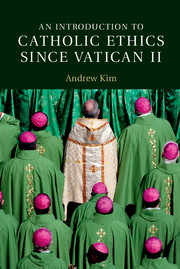Book contents
- Frontmatter
- Dedication
- Epigraph
- Contents
- Foreword
- Preface
- Acknowledgments
- Abbreviations
- Introduction
- PART 1 FOUNDATIONS OF CATHOLIC ETHICS
- PART II GRACE AT THE HEART OF VIRTUE
- 4 The Cardinal Virtues
- 5 The Virtues of Grace
- 6 The Unity of the Virtues
- PART III CATHOLIC SOCIAL TEACHING
- PART IV BIOETHICS
- Epilogue
- Appendix
- Bibliography
- Index
4 - The Cardinal Virtues
from PART II - GRACE AT THE HEART OF VIRTUE
Published online by Cambridge University Press: 05 May 2015
- Frontmatter
- Dedication
- Epigraph
- Contents
- Foreword
- Preface
- Acknowledgments
- Abbreviations
- Introduction
- PART 1 FOUNDATIONS OF CATHOLIC ETHICS
- PART II GRACE AT THE HEART OF VIRTUE
- 4 The Cardinal Virtues
- 5 The Virtues of Grace
- 6 The Unity of the Virtues
- PART III CATHOLIC SOCIAL TEACHING
- PART IV BIOETHICS
- Epilogue
- Appendix
- Bibliography
- Index
Summary
Our present discussion does not aim, as our others do, at study; for the purpose of our examination is not to know what virtue is, but to become good, since otherwise the inquiry would be of no benefit to us.
Aristotle, The Nicomachean EthicsThe importance of virtue in the history of moral theory is sometimes overlooked in contemporary ethics. Virtue is at the heart of the moral outlook found in classical philosophy, and it plays a comparably significant role in the development of the Catholic moral tradition. The influence of virtue as an ethical theory began to wane in the late Middle Ages, however, and nearly vanished with the advent of modernity. This is partly attributable to the popularity of ethical theories considered in the first chapter of this book: emotivism, social contract theory, utilitarianism, and historicism. However, during the same period, reflection on virtue began to vanish even within the field of Catholic moral theology. At least since the Council of Trent, focus tended to be primarily, if not exclusively, on law and obligation understood from within the framework of the sacrament of penance. In the main, this neglect of virtue as a moral theory marked the decades leading up to the Second Vatican Council. Even in the decades that immediately followed the council, Catholic moral theologians concerned themselves largely with questions of foundation and method – the kinds of questions considered in Part I. Indeed, it was relatively late in the post-conciliar period that virtue returned to a place of prominence in Catholic moral theology. Before we can appreciate the return, however, we must understand the beginning. Consequently, the current chapter explores the classical account of the cardinal virtues of prudence, justice, temperance, and fortitude. St. Ambrose referred to these virtues as “cardinal,” from the Latin “ cardo,” which means “hinge” (such as the hinge on a door), because these are the virtues that open the door to the good life.
- Type
- Chapter
- Information
- An Introduction to Catholic Ethics since Vatican II , pp. 61 - 74Publisher: Cambridge University PressPrint publication year: 2015

